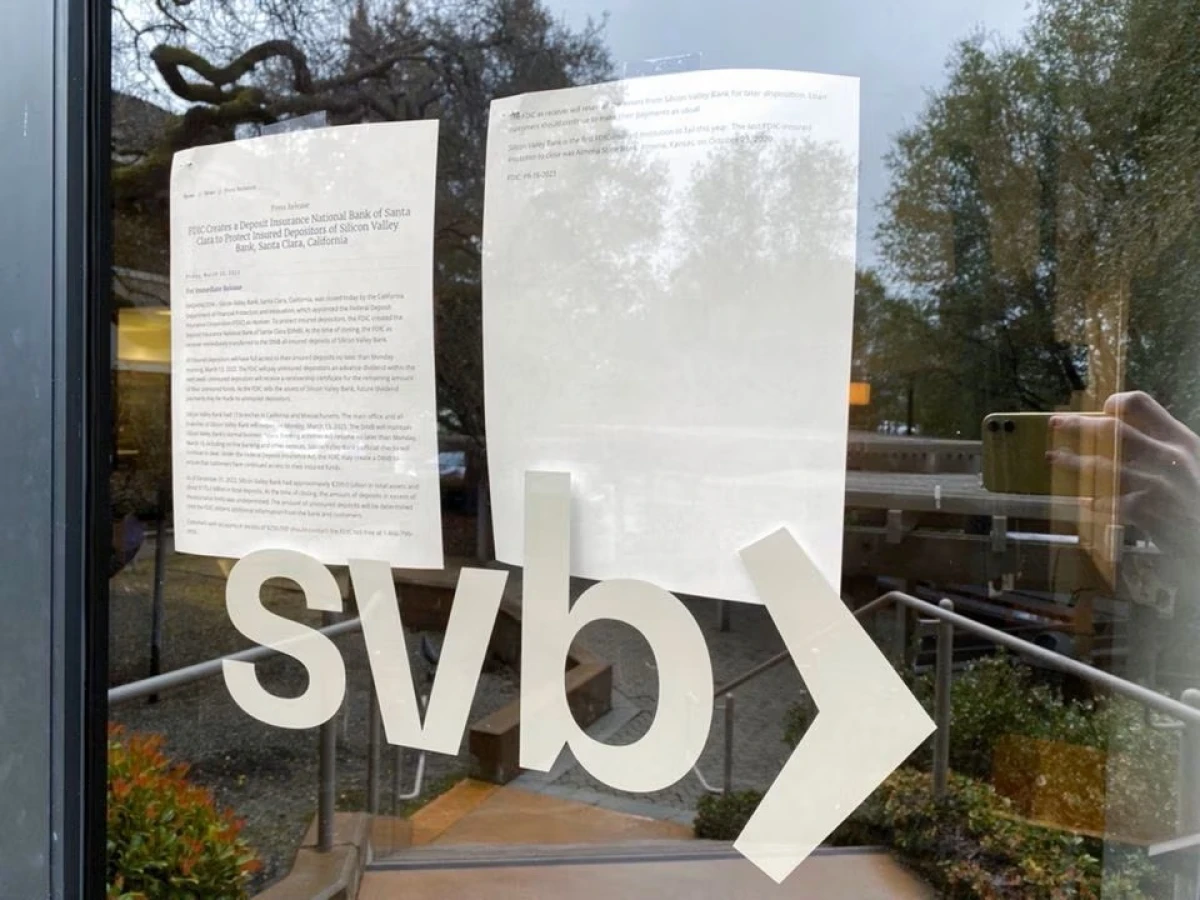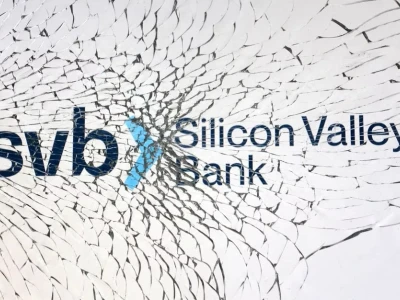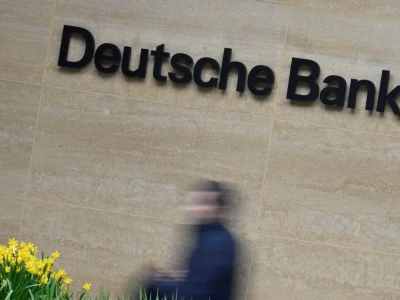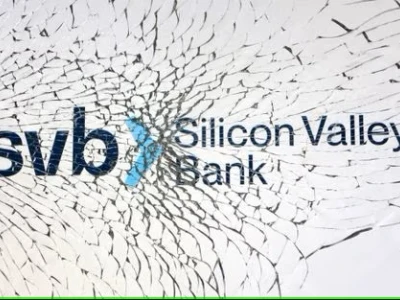
Banking regulators shutter SVB, collapse unnerves investors
U.S. lenders First Republic Bank and Western Alliance said on Friday their liquidity and deposits remained strong, aiming to calm investors.
March 10 (Reuters) - California banking regulators on Friday moved quickly to close startup-focused lender SVB Financial Group, the largest bank failure since the financial crisis, a sudden collapse that prompted the global banking sector to shed billions in market value.
The regulator appointed the Federal Deposit Insurance Corporation (FDIC) as receiver, putting the tech-heavy lender into receivership and will dispose of its assets, according to a statement.
Silicon Valley Bank is the first FDIC-insured institution to fail this year, the FDIC said. The last FDIC-insured institution to close was Almena State Bank in Kansas, on October 23, 2020.
The main office and all branches of Silicon Valley Bank will reopen on March 13 and all insured depositors will have full access to their insured deposits no later than Monday morning, according to the FDIC statement.
Technology workers whose paychecks relied on the bank were worried about getting paid on Friday. An SVB branch in San Francisco showed a Scotch-taped note telling clients to call a toll-free telephone number.
SVB, which does business as Silicon Valley Bank, was not immediately available for comment. Its customers were met with locked doors on Friday. A client dashboard was down, a UK-based client of the bank told Reuters.
Dean Nelson, CEO of Cato Digital, was on a line outside of SVB Santa Clara headquarters, hoping to get answers. Nelson said he was worried about the company's ability to pay employees and cover expenses.
"Access to the cash is the biggest problem for the majority of the companies here. If you’re a startup, cash is king. The cash and the workflow, to be able to have the runway is critical."
U.S. banks have lost over $100 billion in stock market value over the past two days, with European banks losing around another $50 billion in value, according to a Reuters calculation. Regional banks sold off on Friday.
Some forecast more pain for the sector.
"There could be a bloodbath next week as banks are in trouble, the short sellers are out there and they are going to attack every single bank, especially the smaller ones," said Christopher Whalen, chairman of Whalen Global Advisors.
U.S. Treasury Secretary Janet Yellen met with banking regulators on Friday expressed "full confidence" in their abilities to respond to the situation, Treasury said.
The White House on Friday said it had faith and confidence in U.S. financial regulators, when asked about the failure of SVB. Cecilia Rouse, who chairs the Council of Economic Advisers, said the U.S. banking system was fundamentally stronger than it was during the 2008 financial crisis.
The FDIC said it would seek to sell SVB's assets and that future dividend payments may be made to uninsured depositors.
"The first bank failure since 2020 is a wake-up call," said Matthew Goldberg, an analyst at Bankrate. "Even during times when there are no bank failures or few bank failures, you always have to make sure your money is safe and within FDIC limits and rules at an FDIC-insured bank."
PAIN SPREADS
The bank scrambled this week to reassure its venture capital clients their money was safe after a capital raise led to its stock collapsing 60% and contributed to wiping out over $80 billion in value from bank shares.
Shares of SVB remained halted on Friday after tumbling as much as 66% in premarket trading. While the suspension of SVB's shares made it hard to assess how much value was left at SVB, the trading of its bonds offered clues. Most of its long-dated bonds collapsed in value on Friday, with a May 2028 bond trading down from 85 cents to 36 cents on the dollar.
The rout in SVB's stock, which began on Thursday, spilled over into other U.S. and European banks, with the episode spreading concern about hidden risks in the sector and its vulnerability to the rising cost of money. But banking shares were well off their lows on Friday.
U.S. lenders First Republic Bank and Western Alliance said on Friday their liquidity and deposits remained strong, aiming to calm investors.
The S&P 500 regional banks index dropped 4.3%, bringing its loss this week to 18%, its worst week since 2009. The S&P 500 banks index, which includes both large and medium banks, fell 0.5%, bringing its loss this week to over 11.5%.
The problems at SVB underscore how a campaign by the U.S. Federal Reserve and other central banks to fight inflation by ending t he era of cheap money is exposing vulnerabilities in the market.
Global borrowing costs have risen at the fastest pace in decades over the last year as the Federal Reserve lifted U.S. rates by 450 basis points from near zero, while the European Central Bank hiked the euro zone's by 300 bps.
"Silicon Valley Bank is shedding light on vulnerabilities across the US banking sector, primarily in the bond holdings that many large institutions hold," said Karl Schamotta, Chief Market Strategist at Corpay.
'CHAOS' AS CLIENTS RUSH TO WITHDRAW
As higher interest rates caused the market for initial public offerings to shut down for many startups and made private fundraising more costly, some SVB clients started pulling money out.
To fund the redemptions, SVB sold on Wednesday a $21 billion bond portfolio consisting mostly of U.S. Treasuries. SVB announced on Thursday it would sell $2.25 billion in common equity and preferred convertible stock to fill its funding hole.
One UK-based principal at a venture capital firm, who asked to be anonymous because he is not authorized to speak to press, said his firm had rushed to pull “single digit millions” from four accounts at Silicon Valley Bank late on Thursday.
The source characterized the situation as "chaos."
The technology sector has been hit hard and stress has appeared in other corners of the market as rates rise.
Sources familiar with the situation said on Thursday that some startups had advised their founders to pull out money from SVB as a precautionary measure.
Short sellers in SVB have profited by $717 million since Wednesday's close, according to analytics firm Ortex.
"The market is tired of companies that do business with unprofitable companies or that are unprofitable themselves," said David Trainer, CEO of New Constructs, an investment research firm.




